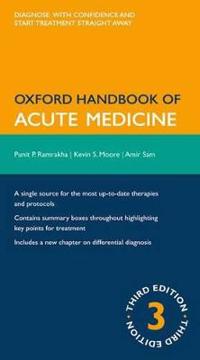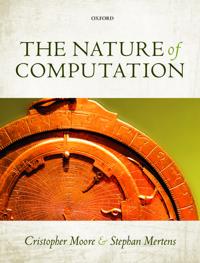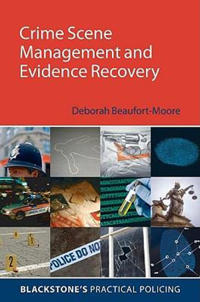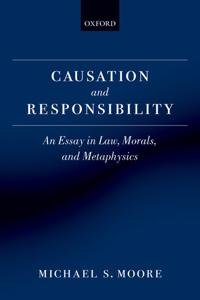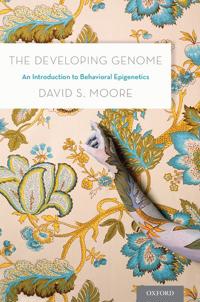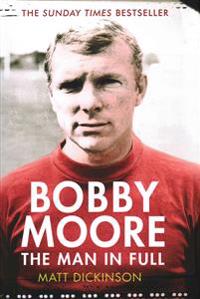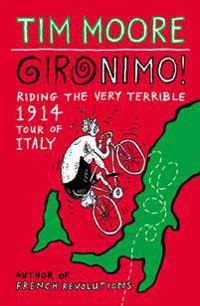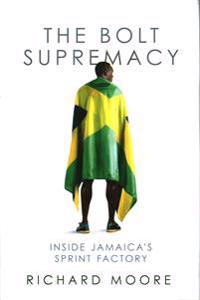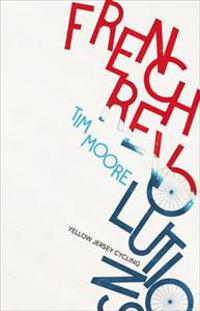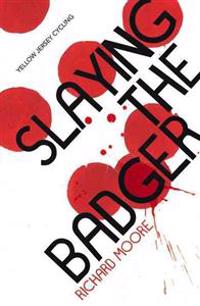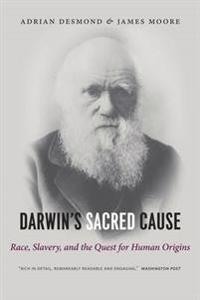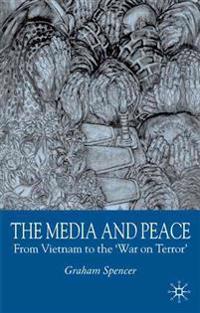Energetic Food Webs (Häftad)
avJohn C. Moore, Peter C. de Ruiter
ISBN: 9780198566199 - UTGIVEN: 201206This novel book bridges the gap between the energetic and species approaches to studying food webs, addressing many important topics in ecology. Species, matter, and energy are common features of all ecological systems. Through the lens of complex adaptive systems thinking, the authors explore how [...]
Survivors: Jewish Self-help and Rescue in Nazi-occupied Western Europe (Inbunden)
avBob Moore
ISBN: 9780199208234 - UTGIVEN: 2010-09-02Oxford Handbook of Acute Medicine (Pocket)
avPunit S. Ramrakha, Kevin P. Moore, Amir H. Sam
ISBN: 9780199230921 - UTGIVEN: 201006The best-selling Oxford Handbook of Acute Medicine is an up-to-date, practical and comprehensive guide to the management of the acutely ill patient. This third edition has been revised throughout to include the most up-to-date guidelines and treatment management plans. A new junior author ensures t[...]
The Nature of Computation (Inbunden)
avStephan Mertens, Cristopher Moore
ISBN: 9780199233212 - UTGIVEN: 201108Computational complexity is one of the most beautiful fields of modern mathematics, and it is increasingly relevant to other sciences ranging from physics to biology. But this beauty is often buried underneath layers of unnecessary formalism, and exciting recent results like interactive proofs, phas[...]
Themes from G.E. Moore (Inbunden)
avHidenori Kusaka
ISBN: 9780199281725 - UTGIVEN: 2007-11These sixteen original essays, whose authors include some of the world's leading philosophers, examine themes from the work of the Cambridge philosopher G. E. Moore (1873-1958), and demonstrate his considerable continuing influence on philosophical debate. Part I bears on epistemological topics, suc[...]
Crime Scene Management (Häftad)
avDeborah Beaufort-Moore
ISBN: 9780199560455 - UTGIVEN: 200903This practical book deals with the subject of crime scene management and evidence recovery, offering step-by-step guidance on the techniques involved alongside clear scientific explanations for the non-specialist. This invaluable practical guide is a must-have for the first responder; whilst crime s[...]
Haematology (Häftad)
avAndrew D. Blann, Gavin Knight, Gary Moore
ISBN: 9780199568833 - UTGIVEN: 201008Biomedical scientists are the foundation of modern healthcare, from cancer screening to diagnosing HIV, from blood transfusion for surgery to food poisoning and infection control. Without biomedical scientists, the diagnosis of disease, the evaluation of the effectiveness of treatment, and research [...]
Esther Waters (Pocket)
avGeorge Moore
ISBN: 9780199583010 - UTGIVEN: 2012-10-11One of the great novels of London life and labour in the 1890s, Esther Waters is the story of a single mother struggling against prejudice and injustice. It vividly brings to life a world of horse racing, gambling, and public houses and was groundbreaking in its approach. This is the only available[...]
Causation and Responsibility (Häftad)
avMichael S. Moore
ISBN: 9780199599516 - UTGIVEN: 2010-07The concept of causation is fundamental to ascribing moral and legal responsibility for events. Yet the relationship between causation and responsibility remains unclear. What precisely is the connection between the concept of causation used in attributing responsibility and the accounts of causal r[...]
A Practical Approach To Planning Law (Pocket)
avVictor Moore, Michael Purdue
ISBN: 9780199640072 - UTGIVEN: 2012-03-22A Practical Approach to Planning Law offers an accessible guide to the complex subject of planning law. The twelfth edition provides full coverage of the changes brought about by the Localism Act 2011 and recent case law.[...]
Visualizing the Invisible (Inbunden)
avPeter Moore
ISBN: 9780199767090 - UTGIVEN: 2012-06Knowledge of the microscopic structure of biological systems is the key to understanding their physiological properties. Most of what we now know about this subject has been generated by techniques that produce images of the materials of interest, one way or another, and there is every reason to be[...]
The Battle for the Life and Beauty of the Earth (Inbunden)
avChristopher Alexander, Hansjoachim Neis, Maggie Moore Alexander
ISBN: 9780199898077 - UTGIVEN: 201210The purpose of all architecture, writes Christopher Alexander, is to encourage and support life-giving activity, dreams, and playfulness. But in recent decades, while our buildings are technically better--more sturdy, more waterproof, more energy efficient-- they have also became progressively more [...]
The Developing Genome (Inbunden)
avDavid S. Moore
ISBN: 9780199922345 - UTGIVEN: 2015-03Why do we grow up to look, act, and feel as we do? Through most of the twentieth century, scientists and laypeople answered this question by referring to two factors alone: our experiences and our genes. But recent discoveries about how genes work have revealed a new way to understand the developmen[...]
Bobby Moore (Inbunden)
avMatt Dickinson
ISBN: 9780224091725 - UTGIVEN: 2014-09This is the Sunday Times Bestseller. 'Immaculate footballer. Imperial defender. Immortal hero of 1966. Master of Wembley. Captain extraordinary. Gentleman of all time.' These are some of the words inscribed beneath the statue of England's World Cup-winning captain, Bobby Moore, at Wembley stadium. S[...]
Bobby Moore (Pocket)
avMatt Dickinson
ISBN: 9780224091732 - UTGIVEN: 2015-09'Immaculate footballer. Imperial defender. Immortal hero of 1966. Master of Wembley. Captain extraordinary. Gentleman of all time.' With these words, inscribed beneath the statue of England's World Cup-winning captain, the nation remembers Bobby Moore. But what do we really know about this iconic fi[...]
Gironimo! (Häftad)
avTim Moore
ISBN: 9780224092074 - UTGIVEN: 2014-05Twelve years after Tim Moore toiled round the route of the Tour de France, he senses his achievement being undermined by the truth about 'Horrid Lance'. His rash response is to take on a fearsome challenge from an age of untarnished heroes: the notorious 1914 Giro d'Italia. This book tells his story[...]
The Bolt Supremacy (Inbunden)
avRichard Moore
ISBN: 9780224092302 - UTGIVEN: 2015-07Beijing 2008, the 100 metres final: Usain Bolt slows down, beats his chest, metres clear of his nearest rival, his face filled with the euphoria of a young man utterly in thrall to his extraordinary physical talent. It is one of the greatest sporting moments. It is just the beginning. Of the ten fas[...]
French Revolutions (Storpocket)
avTim Moore
ISBN: 9780224092388 - UTGIVEN: 2014-05Battling it out with the old men on butchers' bikes across the plains of Aquitaine and pursued by cattle over Europe's second highest road, Moore soon finds himself resorting to narcotic assistance, systematic overeating and waxed legs before summoning a support vehicle staffed by cruelly sceptical [...]
Slaying the Badger (Häftad)
avRichard Moore
ISBN: 9780224099868 - UTGIVEN: 2014-05Greg LeMond, a fresh-faced and mercurial youngster, dubbed 'L'Americain', was a naive Tour newbie. Frenchman Bernard 'The Badger' Hinault was five times winner and as tough as old boots. Though polar opposites, they were both fiercely competitive, both equally brilliant. So why was the world shocked[...]
Gironimo! (Storpocket)
avTim Moore
ISBN: 9780224100151 - UTGIVEN: 2015-04A 3,162 km race. A 48-year-old man. A 100-year-old bike. Made mostly of wood. That he built himself. Tim Moore sets off to recreate the most appalling bike race of all time. The notorious 1914 Giro d'Italia was an ordeal of 400-kilometre stages, cataclysmic night storms and relentless sabotage - all[...]
Darwin's Sacred Cause: Race, Slavery and the Quest for Human Origins (Häftad)
avAdrian J. Desmond, James Moore
ISBN: 9780226144511 - UTGIVEN: 2011-04There has always been a mystery surrounding Darwin: How did this quiet, respectable gentleman come to beget one of the most radical ideas in the history of human thought? It is difficult to overstate what Darwin was risking in publishing his theory of evolution. So it must have been something very p[...]
Global Advanced (Pocket)
avFrances Watkins, Robert Campbell, Julie Moore
ISBN: 9780230033344 - UTGIVEN: 2012-02-29The comprehensive Global Teacher's Book pack contains a wide range of materials for teachers using the course. These include background information and language notes, lesson plans, answer keys and ideas for adapting 'global' activities to local contexts.[...]
The Media and Peace (Häftad)
avPeter Moore
ISBN: 9780230202290 - UTGIVEN: 200804Much is known about the media's role in conflict, but far less about the media's role in peace. Graham Spencer's groundbreaking study, now available in paperback,addresses this deficiency by providing a comparative analysis of the reporting of conflicts from around the world and examining media rece[...]



